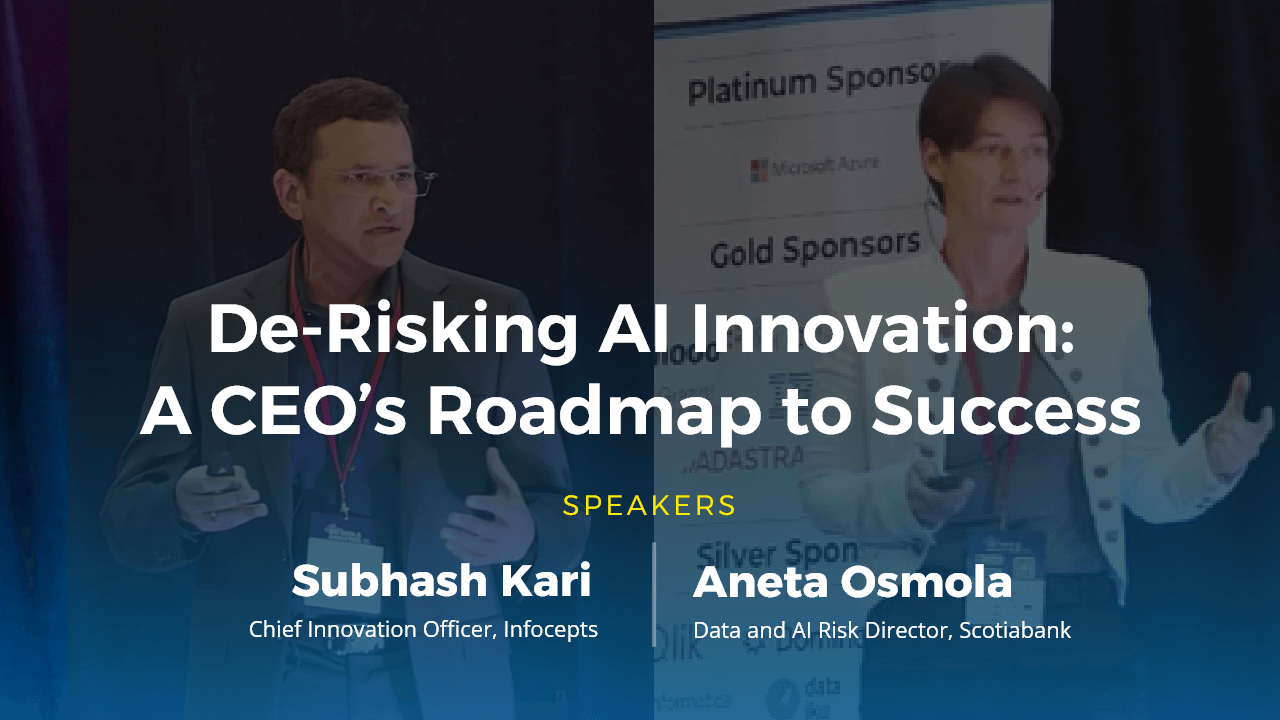
The conversation run-down:
[00:00] – Introduction and AI’s Impact on Business (Subhash Kari)
[01:58] – AI Technologies and Applications (Subhash Kari)
[10:38] – Redesigning Workflows with AI (Subhash Kari)
[12:30] – Challenges in AI Projects (Subhash Kari)
[17:52] – Scotiabank’s AI Strategy (Aneta Osmola)
[21:00] – AI Governance and Ethical Considerations (Aneta Osmola)
[25:58] – Navigating Regulatory Requirements (Aneta Osmola)
[28:09] – Building Trust and Explainability in AI (Subhash Kari & Aneta Osmola)
Subhash Kari, Chief Innovation Officer at Infocepts, and Aneta Osmola, Data & AI Risk Director at Scotiabank, recently shared approaches and real-life examples of de-risking AI innovation to achieve improved business outcomes at the Big Data Analytics Summit in Toronto. They emphasized the importance of strategically implementing AI to maximize business benefits while mitigating risks. Both experts underscored the necessity of a well-defined AI strategy, focusing on practical applications and responsible governance.
Subhash Kari highlighted the pervasive impact of AI on businesses today, noting that while AI holds the promise of transforming various aspects of business operations, the key challenge lies in balancing innovation with risk management. He stressed that AI’s primary function is prediction, which can be harnessed for competitive advantage if managed correctly. Kari emphasized the importance of understanding how AI technologies like semantic AI, discriminative AI, and logic-based AI can drive business value while recognizing their varying levels of uncertainty and novelty. He also introduced Infocepts’ DiscoverYai, a fully managed AI experimentation and management solution designed to help organizations effectively implement and scale AI initiatives.
Aneta Osmola outlined Scotiabank’s approach to integrating responsible AI practices within their organizational framework, detailing how ethical considerations are embedded in AI development from the outset. She highlighted the significance of cross-functional collaboration and continuous learning to adapt to evolving regulatory requirements. By partnering with research institutions and leveraging industry best practices, Scotiabank aims to foster trust and transparency with both customers and employees.
Both Kari and Osmola agreed on the critical role of leadership in driving AI initiatives. They emphasized that successful AI implementation requires not only technological investment but also a cultural shift within the organization. This includes educating business units, compliance teams, and regulatory affairs departments on the nuances of AI. They advocated for a comprehensive assessment of an organization’s AI readiness, urging leaders to ask fundamental questions about their AI capabilities, usage, and alignment with business objectives.
To gain deeper insights into your organization’s AI readiness and to chart a path towards successful AI implementation, sign up for Infocepts’ State of Data & AI Assessment today. This comprehensive evaluation will help you identify your strengths and areas for improvement, ensuring your AI initiatives deliver maximum business value while minimizing risks.

